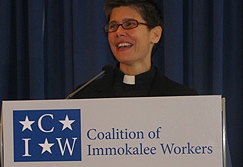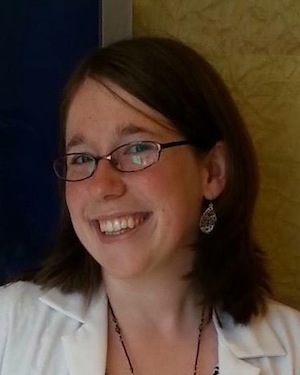[wpcol_1half id=”” class=”” style=””]
“Lazarus, come out!” cries Jesus to his friend who had been dead four days. As the dead man came out of the cave, his face wrapped and his hands and feet bound with strips of cloth, Jesus commanded the astonished crowd, “unbind him and let him go.”

The haunting story of Lazarus itself insists that new life begins here in the midst of this life filled with very real death, very real grief, very real betrayals, very real fear, and very real domination. Indeed, through the unbinding process, Lazarus and those who unbound him have become exposed, physically, politically, spiritually, socially. But Lazarus and other friends of Jesus are not afraid because they are already dead to a life bound by the desire to survive. It takes some guts for Lazarus and his family to invite Jesus, who now had a death sentence on his head, to dinner before the Passover. Soon after this dinner the authorities were gunning for Lazarus as well. But their “exposure” bred within them courage, not concern. By Jesus’ loving power we too are coaxed from a life ruled by fear and death into new life; a life of vulnerability, courage, and community guided by God’s sovereign love.
[/wpcol_1half] [wpcol_1half_end id=”” class=”” style=””]
When I heard this new online justice journal was seeking a name, I immediately thought of the Lazarus story. For Unbound will be a journal about resurrection in this life—as justice pursues the great tikkun (healing) that it may be “on earth as it is in heaven.”
And this journal is “unbound” from the limitations of paper and ink; able to roam freely in electronic space (which means more opportunities for interaction, connection and extension of articles) as well as the market (for readers pay nothing to subscribe). Further, being thus unbound, this journal is resoundingly public. It is accessible to anyone who has an internet connection. The ruminations of prayer and pondering “within” the journal immediately take on an invitational stance to those “beyond,” even as this virtual unbinding underscores the need for transparency and accountability among all participants. In Unbound, some are authors, all are contributors. What commitments will be more rightly exposed; what boundaries traversed; what assumptions loosened; what power freed, what new liberating connections discovered by such a shared effort?
May this journal be a catalyst for shared reflection with people who would not have been able to afford this journal were it in print, may it serve as an analytical partner for the engaged, daily struggle for justice, and may it be a wormhole defying geographical boundaries that might have otherwise precluded or delayed the participation of sisters and brothers around the world.
Becoming unbound fundamentally requires community. We cannot unbind ourselves, we must entrust ourselves to the hands of another. In this great, cooperative, unraveling now known as “Unbound,” may we experience the mystery and justice of resurrection here and now.
[/wpcol_1half_end]
 The Rev. Noelle Damico is the Associate for Fair Food within the Presbyterian Hunger Program, where she assists Presbyterians in education and action that ensure food, human rights and just social relationships. She facilitates the denomination’s involvement in the Campaign for Fair Food, our partnership effort with the Coalition of Immokalee Workers to advance human rights and socially responsible purchasing in the food industry, and sits on the General Assembly Mission Council human trafficking roundtable. A published author of biblical, theological and liturgical resources, she is a contributor to the new Preaching God’s Transforming Justice lectionary commentary, published in August 2011 by Westminster/John Knox. She is married to the Rev. Jeffrey Geary, pastor of White Plains Presbyterian Church and they live with their five year old son, August Xavier, in White Plains, New York.
The Rev. Noelle Damico is the Associate for Fair Food within the Presbyterian Hunger Program, where she assists Presbyterians in education and action that ensure food, human rights and just social relationships. She facilitates the denomination’s involvement in the Campaign for Fair Food, our partnership effort with the Coalition of Immokalee Workers to advance human rights and socially responsible purchasing in the food industry, and sits on the General Assembly Mission Council human trafficking roundtable. A published author of biblical, theological and liturgical resources, she is a contributor to the new Preaching God’s Transforming Justice lectionary commentary, published in August 2011 by Westminster/John Knox. She is married to the Rev. Jeffrey Geary, pastor of White Plains Presbyterian Church and they live with their five year old son, August Xavier, in White Plains, New York.






Unbound Social